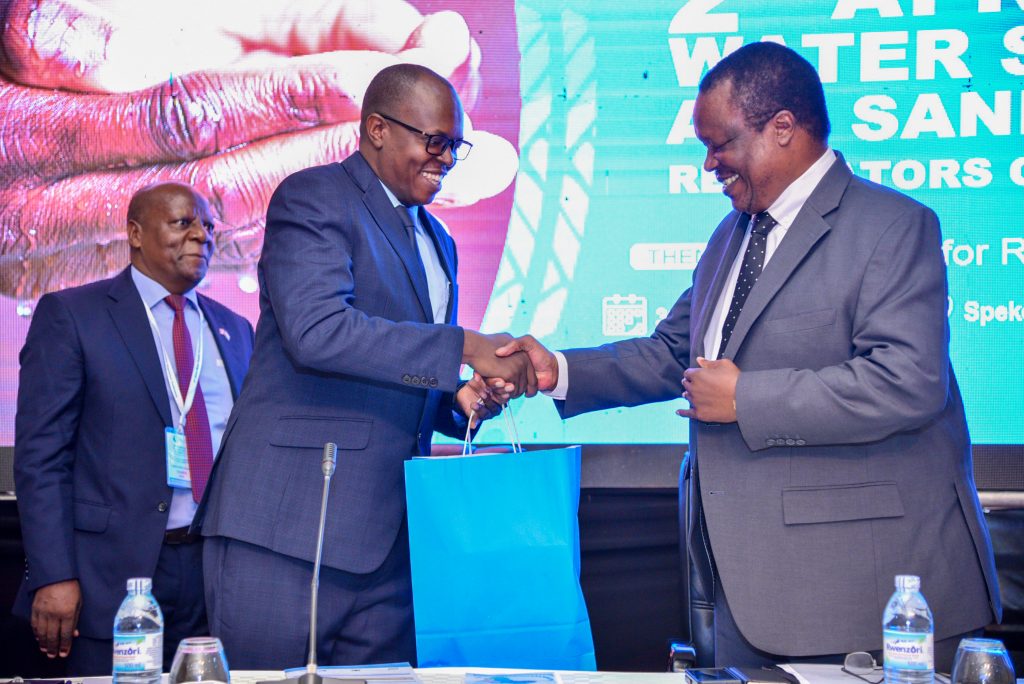The 2nd Africa WSS Regulators Conference was held under the auspices of the Water Utility Regulation Department (WURD) of the Ministry of Water and Environment of Uganda at Munyonyo Resort and Conference Centre from 3rd to 5th October 2023. It was attended by more than 150 participants from 44 African countries and over 18 partners supporting regulation. Delegates included representatives of institutions with regulatory mandate, Ministries, utilities and partners such as AMCOW, AFUR, AfWASA, BMGF, WHO, UNICEF, WIN, WSUP, NIYEL among others. The two and half day conference was followed by the ESAWAS Annual General Meeting on 6th October to discuss the internal operations of the Association.
The 2023 Conference theme was “Initiatives for regulatory impact”. The selection of this theme was grounded on ESAWAS’ cognisance of the fact that, while implementation of regulation should align with the specific context of a country, the principles of regulation are the same. This allows for sharing of knowledge and experience for adoption and adaptation of good practices.
The conference was an opportunity to showcase various initiatives instituted by regulators, policy makers and stakeholders to address sector challenges and create positive lasting impacts in the WSS sector through effective regulation. The conference also served as a podium for gathering evidence on the beneficial role of regulation by demonstrating its impact on WSS service provision.
The opening ceremony featured welcoming remarks, keynote presentations and addresses by different sector experts as well as official opening speech by the Minister of Water and Environment in Uganda. All the speakers reiterated the importance of regulation in advancing WSS service provision and ultimately accelerating the progress towards achieving SDG 6 targets.
Delivering his welcoming remarks, the Chairperson of ESAWAS, Mr Balthazar Nganikiye, provided a brief background of the Association and highlighted the key achievements of the period. These included the technical assistance and advocacy provided to countries wishing to establish WSS Regulators or strengthen existing regulatory institutions; support to members for the implementation of Citywide Inclusive Sanitation and the implementation of a public data systems strengthening strategy that will assist countries to improve the accuracy and reliability of data. Other notable achievements are the capacity building of members in various aspects of regulation and the development of the feasibility strategy for a dedicated Africa-based WSS regulation training centre. Speaking on the conference theme, the ESAWAS Chairperson underscored the role of WSS regulators in meeting SDG 6 targets, emphasizing the importance of learning and possibly adopting successful initiatives to accelerate improvements in WSS service provision.

The opening of the conference was officiated by Honorable Sam Cheptoris, the Minister of Water and Environment in Uganda. In his speech, he lauded the efforts and collaboration between ESAWAS and the Ministry in coordinating the conference. He emphasized the role of effective WSS regulation in achieving the SDGs, but also the national development agendas by improving service coverage, quality and sustainability while ensuring access to service by vulnerable and low-income populations. Referring to the detrimental impacts of climate change on water and sanitation services, he implored the conference participants to devise and implement mitigation and adaptation measures to address not only climate change impacts but also effects of population growth, rapid urbanisation and other global uncertainties.
The official opening was followed by keynote remarks and presentations. Speaking on behalf of the Executive Secretary of AMCOW, Mr Thomas Banda provided insights on policy initiatives to support regulation. Video remarks by Mr Osward Chanda of the African Development Bank and Mr Gustavo Saltiel of World Bank outlined the Banks’ support programmes for strengthening WSS regulation. Mr James Manda, the Technical Manager at African Forum of Utility Regulators (AFUR) presented the key emerging areas for consideration in regulation.
The keynote presentation by the ESAWAS Executive Secretary set the stage for conference deliberations, outlining key aspects to be discussed that demonstrate that the cost of non-regulation is higher than the cost of establishing a regulator. This was covered in various technical presentations grouped into the following three categories:
- Initiatives in policy, legal and regulatory mechanisms
- Initiatives in regulatory tools
- Initiatives in cooperation and joint-action
